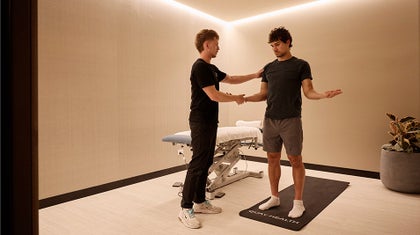Embracing "no": what we can learn from rejection therapy
by Patrick Ibsen on Thursday 17 July 2025
3 min read
Embracing "no": what we can learn from rejection therapy
What if the secret to building confidence was to seek out being knocked back? It might sound counterintuitive, but that's exactly what rejection therapy suggests. For most of us, hearing "no" ranks somewhere between uncomfortable and downright terrifying.
We'll go to extraordinary lengths to avoid rejection – skipping opportunities, diluting our requests, or not asking at all.
But what if rejection isn't the enemy we think it is? What if it's actually a muscle that strengthens with use? This unconventional approach to personal growth has been gaining traction for good reason – it works.
Let's explore how deliberately collecting rejections could transform your relationship with confidence, anxiety, and ultimately yourself.
What is rejection therapy?
Ever noticed how the fear of hearing "no" can stop you dead in your tracks? That's where rejection therapy comes in – a unique self-help approach that encourages you to actively seek out rejection. Yes, you read that right. The goal is to collect rejections like badges of honour, gradually becoming desensitised to the sting they carry.
The concept is beautifully simple: by facing rejection head-on, you:
- build resilience
- reduce anxiety,
- and ultimately boost your confidence.
How rejection therapy works in practice
Wondering how to deal with rejection by actually seeking it out? Here are some practical examples of rejection therapy in action:
Start small and specific
- Ask for a discount at your local café even though there's no promotion running.
- Request a behind-the-scenes tour at a restaurant.
- Ask a stranger for a small favour, like borrowing their phone.
- Ask for an upgrade on your next flight.
Level up your challenges
- Request a job interview at your dream company, even if they're not advertising.
- Propose an unconventional idea at your next work meeting.
- Propose a collaboration with someone you admire professionally.
The key is consistency. By collecting one rejection per day, you gradually rewire your brain to see rejection as merely information, not a reflection of your worth.
What are the benefits of the rejection therapy?
You learn that rejection isn't personal - Most of the time when someone says "no" to you, it's not actually about you - it's about their own hangups, bad timing, or the things going on in their life. This virtue of self-reflection is incredibly liberating.
Your success rates will increase - Ironically, when you're comfortable with rejection, you start hearing "yes" more often. Your confidence becomes attractive, and people respond to it. Just take a look at this content creator on TikTok telling a crowd of random people it’s her birthday and the crowd all sing her happy birthday.
Your fear loses its grip - With each rejection, the anxiety around potential future rejections diminishes. As author Jia Jiang (who documented 100 days of rejection) discussed in a TED talk, finding calm in uncomfortable situations becomes second nature.
Your creativity flourishes - When you're no longer paralysed by the fear of rejection, you'll throw more ideas out there, take more chances, and explore more possibilities.
Your self-esteem deepens - Perhaps most importantly, rejection therapy reminds us of the importance practicing self-love has regardless of external validation. Your worth isn't determined by others' responses.
Is rejection therapy for everyone?
While actively seeking rejection can be transformative, it's not necessarily for everyone; that's perfectly okay.
If you're experiencing serious anxiety or depression right now, diving headfirst into rejection challenges might not be the best approach.
However, we can all benefit from understanding the three core principles of rejection therapy:
- building confidence often requires pushing through discomfort,
- rejection rarely defines us, and
- growth happens at the edge of our comfort zones.
Even starting with small steps – like more directly asking for what you want or speaking up when you'd normally keep to yourself – can help build your rejection resilience muscle.
Finding your confidence community
Virgin Active's group classes offer the perfect space to challenge yourself in a community that celebrates effort over perfection. Classes like Yoga and Pilates create a judgment-free zone where you can try new movements, occasionally wobble, and grow stronger – both physically and mentally.
Remember: the more comfortable you become with hearing "no," the more freely you'll live – that's a therapy worth embracing.
Related articles
Move
3 min read
Physiotherapy: Not Just for Injuries
Nourish
3 min read
The pre-game plate: how to eat like an athlete before a fitness event
Unwind
3 min read
Mouth-taping sleep trends: nose vs mouth breathing facts
Enjoying our blog?
Sign up to our newsletter to get updates on training, healthy living, news and events.






